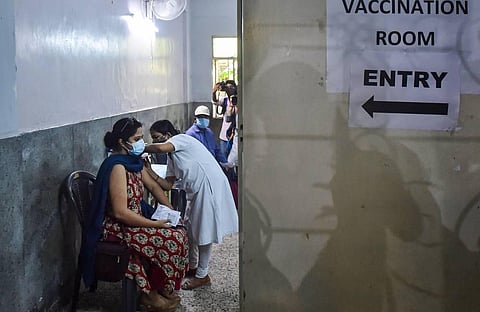

NEW DELHI: In high-transmission settings, vaccinating key workers, including healthcare professionals, first, followed by those above 60 years and then comorbid individuals aged 24 to 60 years will have a greater impact in reducing COVID-19 morbidity and mortality, according to a mathematical model-based analysis.
Highlighting the findings of the study, the Indian Council of Medical Research (ICMR) said in low-intensity transmission areas such as sparsely populated areas, vaccinating individuals with comorbidity after key workers and then reaching out to those above 60 years appears to be an elegant public health approach.
The study -- 'India's pragmatic vaccination strategy against COVID-19: A mathematical modelling-based analysis' -- authored by Sandip Mandal, Balram Bhargava and Samiran Panda from the ICMR and Nimalan Arinaminpathy, from the Imperial College, London, has been published at peer-reviewed open access journal BMJ Open on July 2.
In this study, researchers used a simple mathematical model of transmission dynamics, to show how vaccination efforts in the country might best be focused in order to reduce mortality most effectively with a finite vaccine supply.
As part of the analysis, a comparison of different vaccine strategies was done by targeting priority groups such as key workers, including healthcare professionals, individuals aged between 24 and 60 years with comorbidities and those above 60 years.
"Our results suggest that vaccinating all defined priority groups would have a substantial reduction in overall health burden compared with a scenario of no vaccination and complete lifting of restrictions," the study said.
According to the study, the priority groups together account for about 18 per cent of India's population.
An infection-preventing vaccine with 60 per cent efficacy covering all these groups would reduce peak symptomatic incidence by 20.6 per cent and cumulative mortality by 29.7 per cent, the results of the study showed.
A similar vaccine with the ability to prevent symptoms but not infection will reduce peak incidence of symptomatic cases by 10.4 per cent and cumulative mortality by 32.9 per cent, it said.
"In the event of insufficient vaccine supply to cover all priority groups, model projections suggest that after key workers, vaccine strategy should prioritise all who are above 60 and subsequently individuals with comorbidities," the study stated.
In settings with the weakest transmission, such as sparsely populated rural areas, those with comorbidities should be prioritised after keyworkers.
An appropriately targeted vaccination strategy would witness substantial mitigation of the impact of COVID-19 in a country like India with wide heterogeneity, it said.
"Smart vaccination, based on public health considerations, rather than mass vaccination, appears prudent," it concluded.
ALSO WATCH: